
We all are familiar with tonsils, but there is a tonsil-like lymphoid tissue on the back of the throat, called adenoids. Swollen adenoids in adults can cause severe discomfort and lead to various health problems. Read on…
Just like tonsils, adenoids are also lymphoid tissues, assigned with the task of aiding the immune system in fighting infections. While, tonsils are like two masses of tissues, located on either side of the back of the throat, adenoids are located high in the throat, behind the soft palate and at the back of the nose, where the nose merges with the mouth. Tonsils, being situated in the throat are visible, but adenoids can be seen through the mouth only with the help of special instruments. Read more on lymph nodes in the neck.
Functions and Growth of Adenoids
Adenoids, along with tonsils, help the body to fight infections. While breathing, air-borne disease causing germs, enter the mouth and get trapped by the sticky mucus and the hair. Adenoids produce antibodies and white blood cells to destroy these germs. While carrying out this functions, the adenoids are exposed to the risk of getting infected. This leads to inflammation of the adenoids, which can cause further complications.
During birth, the babies may not have visible adenoids and tonsils. As the baby grows, the adenoids along with tonsils increase in size and a peak size is attained within the age of five. However, the size gradually decreases and both will shrink before the child reaches puberty. It has been observed that this happens, as the child crosses six or seven years of age. So, enlarged or swollen tonsils and adenoids in adults are not common, as in children. But, in some children, the adenoids and tonsils do not shrink with time and such kids may carry this condition in adulthood too. In some other cases, shrunk tonsils or adenoids in adults may get infected. Read more on swollen tonsils treatment.
Swollen Adenoids Symptoms in Adults
Owing to the strategic location of the adenoids, an inflammation of adenoids may lead to severe discomfort to the affected person. The severity of symptoms may vary with the degree of infection and inflammation. An infection of adenoids in adults results in its swelling. As the adenoids are located in the airway, an inflammation of the adenoid obstructs air passage and causes symptoms, like, snoring, blocked nose, nasal speech, dry or sore throat in the morning, habit of keeping the mouth open, etc.

It has also been observed that in most cases of adenoid infection, the tonsils too get infected and inflamed simultaneously. The enlarged tonsils and adenoids, form a ring-like structure, on the back of the throat, which narrows the airways and leads to restricted supply of air to the lungs. During day time, this is compensated by breathing through the mouth. But, during night, the muscles of the airways are relaxed, thereby causing further blockage. A drop in the air pressure to the lungs leads to apneas (temporary inability to breath), which in turn results in interrupted sleep. Such condition is termed as obstructive sleep apnea. Other adenoid symptoms in adults include fatigue, headaches, etc, due to inadequate sleep.
Swollen adenoids in adults may cause obstructive sleep apnea, which, if left untreated may lead to high blood pressure, heart problems, etc. Infection of the adenoids in adults may spread to the ears and cause middle ear infections, which may affect hearing too. Another condition called glue ear (build-up of sticky mucous in the middle ear) can also be caused by adenoids infection. Adenoid infection may also cause sinus infections, chest infections and vomiting.
Adenoid Surgery in Adults
In children, the adenoids can get bigger in size and the size of the adenoids vary from one child to another. In some children, it can grow to the size of a ping pong ball. However, the enlarged adenoids in most children get shrunk and flattened as they grow. If the enlarged adenoids are causing recurrent ear infections or severe sleep apnea, then surgery to remove the adenoids (adenoidectomy) is suggested. Adenoidectomy is recommended for adults experiencing the same symptoms. Though, it is very uncommon to find swollen adenoids in adults, there are people who develop severe adenoid symptoms and require adenoidectomy. Adenoid surgery in adults is also suggested for severe snoring or in case of cancer of the region.
Though, very rare, swollen adenoids in adults can cause almost similar symptoms as in the case of children. It is not a life threatening condition, but you have to seek immediate medical attention, in case you observe some severe symptoms. Otherwise too, you have to consult a doctor, for swollen adenoid symptoms in adults.
